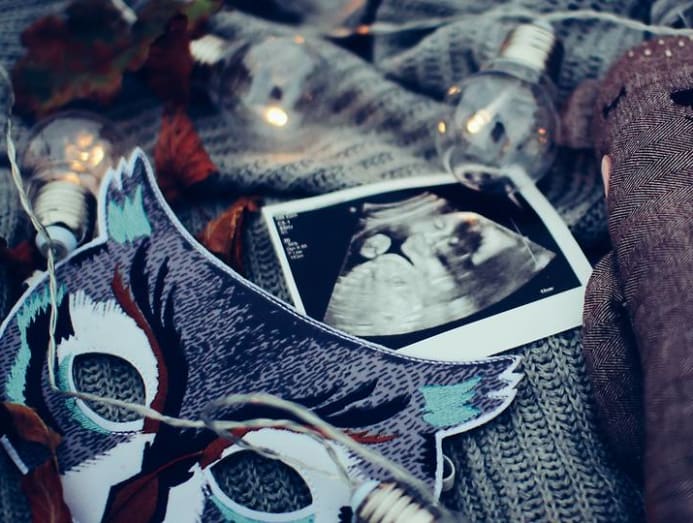commentary Commentary
Commentary: Finding the words to the silent grief of a pregnancy loss
Rather than just offering sympathy or support, asking after the baby can help families deal with grief, say three observers.

(Illustration: Mediacorp)
BIRMINGHAM: Pregnancy loss can be an isolating experience for women and their families.
The grief experienced may be intense, but the feelings of the bereaved may not be recognised – even by close friends and relatives – because pregnancy loss is not widely discussed.
But why do so many people struggle to find the right words of comfort for a family member? Why do they choose to stay silent even when they feel empathy for a colleague?
After all, pregnancy loss is a fairly common experience. In the UK, about one in four pregnancies end in miscarriage, and in 2016, 3,112 babies were stillborn – about one in every 225 births.
USING SYMBOLS AND METAPHORS
In the Death before Birth project (DBB), we looked at the experiences of families who had been through different types of pregnancy loss. We were especially interested in the metaphors they use to describe the experience.
Metaphor is a device through which people define one thing in terms of another – like describing a loss as a “journey”. We reach for metaphors when we are struggling to communicate emotionally difficult experiences such as depression, pain and death.
Examining the metaphors that people use can help us to understand the complex feelings that pregnancy loss can provoke. In doing so, we aimed to go some way towards breaking the silence around the subject.
Some of the women in our study described both the physical loss and the emotional loss in terms of emptiness. Although it is common to talk about feelings of emptiness after bereavement, for those we interviewed, this emptiness appeared to be much more poignant because of its link to the physical experience of pregnancy.

In order to compensate for this loss, many of the people we interviewed chose to have their baby’s name – or symbols associated with the baby – tattooed on their body in order to retain a permanent connection.
When well-meaning friends and family use language that minimises what has been lost (“be grateful you never knew them”) or that tries to refocus attention on positives, such as other children (either current or future), it downplays the physical dimension. And for many people, the lost babies are still very much “alive” on a spiritual level. As one parent commented:
I wanted to bury him with other babies to keep him company
A healthcare professional we spoke to observed that it was important for parents to be allowed to cuddle and wash the stillborn baby. Parents whose baby is stillborn or who experience a pregnancy loss are still parents.
READ: Did I create life or destroy them? A mother’s grief over losing 3 babies
Many of the people we interviewed expressed the need to continue engaging in parenting behaviour years after their loss. Some chose to carry out parenting activity through charity work – with one couple saying this was the only way they felt they could “parent” their lost baby.
DO NOT BE AFRAID TO ASK
So how do we start a conversation with friends and family who have experienced pregnancy loss?
Many people wish to offer support but simply don’t know what to say. Our research indicates that, as a starting point, we shouldn’t be afraid to ask about the baby (and to use the baby’s name if they had one) rather than simply extending sympathy for “their loss”.
Asking questions about a baby, such as the name or about toys that parents may have chosen for them, shows an understanding that for the bereaved, the continued identity of the child is very important.

Many of the people we talked to said they felt they were in a “different world”, with many experiencing time differently as if they were living in a parallel reality. They were aware that time is moving on for everyone else, but not for them. One said:
It’s so hard because you come out of the hospital and the world is still carrying on but your world has stopped.
When talking to a colleague or friend who may feel this way, it is important to be sensitive to their sense of where they are in time.
Don’t try to rush them through time by saying that they will feel better in a few months or next year. Instead, it may simply be helpful to ask parents how they are doing on a particular day.
When time is working differently for someone who has lost a baby, a day might feel like a lifetime or a week like a second. Avoid questions about whether they are “better now” or “over it”.
Acknowledging that a parent may be experiencing a different reality from your own can also be helpful. Using language that shows empathy for what they are going through rather than creating further distance is likely to be welcomed.
Avoid, for example, language that suggests that you are observing them from the outside, such as “I can’t imagine what you’re going through”. Instead, as The Miscarriage Association suggests in its Simply Say campaign, try just saying:
I am here to listen.
The key to being supportive starts with recognising when someone who has experienced pregnancy loss is grieving, and to say something that acknowledges that loss. Word by word, we can help to break the silence.
Jeanette Littlemore is professor of English language and applied linguistics, Kate Rumbold is senior lecturer in English, and Sarah Turner is research fellow in English and Applied Linguistics, all at the University of Birmingham. A version of this commentary first appeared on The Conversation. Read it here.







